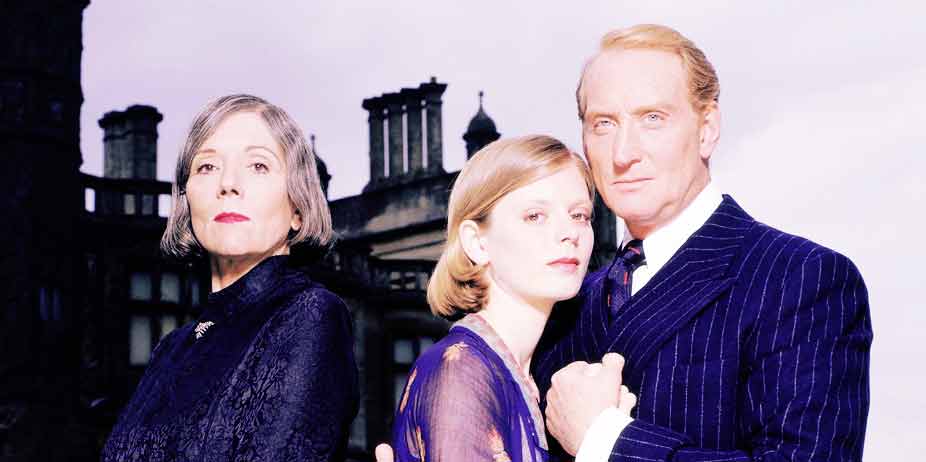 Rebecca
(1997)
Rebecca
(1997)
Daphne du Maurier's Rebecca is second only to Charles Dickens' A Christmas Carol when it comes to memorable ghost stories -- or so says the host of Masterpiece Theatre, which weaves a spellbinding premise around a truly enthralling -- if at times horrific -- story. Many consider this adaptation to be poor in contrast with Hitchcock's earlier masterpiece (which consequently won an Oscar for Best Picture) but this is more faithful to the novel and in many ways presents us with the meat of the storyline rather than the sheer horror of the plot.
Contrary to popular belief, Rebecca is not a ghost story. Not really. The only "ghost" is the memories which invade Manderley, the wonderful, sinister old house where Max de Winter and his wife Rebecca lived in wealth and distinction among the locals. Since her drowning death in the bay below the manor, Max (Charles Dance) has traveled to Monte Carlo to escape the memories and faces which remind him of his newly departed bride. Once there he meets the acquaintance of a young woman (Emilia Fox) training to be a ladies' maid for a vulgar socialite. During Mrs. Van Hopper's illness in bed due to sick headaches (the result of a "lack of good company") the young woman accompanies Max on his many daily outings. They drive along the coast, visit some of the sights, and generally find one another wonderful company.
When Mrs. Van Hopper informs her they are abandon Monte for New York and "better society," our heroine is distressed... and Max refuses to allow her to escape him. He offers his hand in marriage, despite the vast gap in their ages and social standing. Blushingly his bride-to-be accompanies him on a wonderful honeymoon before arriving at Manderley as the "new" Mrs. de Winter. Most of the staff are eager to welcome her into their midst, as shy, insecure, and unpracticed as she may be. Her single opponent is the resolved, strict, and intimidating Mrs. Danvers (Diana Rigg), who seems coldly determined to make Mrs. de Winter feel ill at ease within the house. Everything at Manderley belongs to Rebecca... everything from Max's yet unhealed heart to the arrangements in the Morning Room, even the stationary in the desk. All remains untouched, as if in a shrine.
The more Mrs. de Winter attempts to avoid the powerful seductive lure of Rebecca's lingering presence, the more she finds herself questioning this "perfect, poised, articulate" woman. There seem to be conflicting reports about her character. A mad seaman on the beach says she had "witch eyes." The gardener admits she was a beautiful woman, but nothing akin to her replacement's "sweetness and sincerity." Max just plain refuses to speak of her. Our heroine must deal with memories that are not her own, learn to throw aside her shyness and take a firm stand against the virtual demons in her life... before her world is shaken by a terrible, devastating discovery which might threaten her happiness at Manderley forever.
One aspect about this production I liked over the original is the way it manages to flesh out more of the novel, whereas Hitchcock attempted to compress the story into a mere two hours. The casting is actually quite good, but takes a little getting used to. Charles Dance I had my doubts about early on in the production, but he rapidly seduces the audience with his charm, composure, and violent reactions to the mention of his wife's name. Emilia Fox in her first role (prior to playing Miss Darcy in Pride & Prejudice) adapts to the shy heroine demanded of her, managing to be both hot-tempered when needed, as well as maddeningly submissive to the point of folding beneath Mrs. Danver's evil eye. Our complex villainous housekeeper is given a particularly memorable performance by Diana Rigg, who can transform from empathy to cruelty in a moment's notice. The film is also quite interesting to look at, despite it's 1930's setting, and much of the dialogue is taken right out of the book.
To my surprise, the content in Rebecca is very light. The worst of it comes in a scene of violence and numerous mild profanities scattered throughout the script (including two unfortunate abuses of Christ's name, and one GD). There are a few mild sexual references, discussion on "lovers" in retrospect, heavy implications that several minor characters were involved in adulterous relationships. (Talked about, but never seen, though one of them flirts shamelessly with Mrs. de Winters.) Near the end of the first half, prompted by Mrs. Danvers' eerie suggestion that Rebecca might be "watching her" with her husband, Mrs. de Winters briefly remembers a flashback of them together in bed. The shot is not graphic, the camera is no higher than their shoulders, and involves only kissing. Later the newlyweds are shown cuddling bare-shouldered together in bed.
However, there are two notable things I should mention, which prove equally problematic on the written page. One is a scene in which a woman is attacked and strangled, which contrasts Hitchcock's more submissive suggestion that she was thrown to the floor and hit her head against a piece of iron. Spoilers contained within. The other is the fact that a murderer is allowed to escape justice, therefore rationalizing that his behavior was acceptable due to insinuating circumstances that the woman in question was violating her marriage vows. This is also compromised by a plot twist later implicating the woman wanted to be killed. Spoiler ended. By no means a perfect tale, but one most viewers will find hauntingly mesmerizing.
